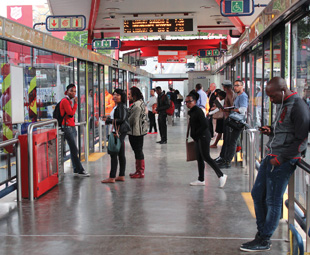How about #FaresMustFall?

Observers are warning that, in 2016, the economy will either go into free-fall, or somehow start to claw back some of the ground lost through mismanagement and incompetence. Can public transport play a part?
Yes, it can; both politically and economically. This is an election year, and, once again, the opportunity presents itself for the electorate to have its say. Writing in the Sunday Times of December 20, 2015, Xolela Mangcu, professor of sociology at UCT, predicts that “the mass desertion of voters from the ANC is only going to get worse in 2016”.
I don’t think that he had public transport in mind, where there surely has to be a significant overlap between the approximately 11 to 12 million South Africans, who vote for the ANC, and the seven to eight million South Africans, who make (reluctant) use of minibus taxis every day.
The ongoing tolerance by these passengers, of a government that subjects them to such “unequal” travelling conditions, baffles me. Taxi users outnumber bus and train users by three to one, but pay up to four times more to travel the same distance. When is someone going to wake up to this carry over from the apartheid era and start a #FaresMustFall campaign?
Why do opposition parties have so little to say about public transport issues? The DA is doing a reasonable job in the Western Cape, but elsewhere it is ineffective. I am even more surprised at the silence of the EFF on this topic. Even a modest stay-away from voting by disgruntled public transport users could result in a major re-alignment in South African politics.
It should, however, be more about economics than politics. All South Africans could start focusing on how improved public transport can help to ward off the economic hardship that is on its way. We are uptight about spending R1 trillion on a nuclear programme, but we get exactly the same figure if we multiply the eight million cars on our roads by a modest R125 000 each.
A power station lasts at least 40 years, but we have to replace cars every ten to 12 years. We need R600 billon a year to pay off these cars and to pay for their parking, maintenance, insurance and fuel … even the banks have now started to warn our “maxed-out” community – specifically would-be car owners – of the risks of overreaching in these uncertain times.
Even a more modest three to four-percent growth in car usage is unsustainable if the rest of the economy is growing at less than two percent. My guess is that some of the abnormal growth in traffic is due to minibus taxi passengers switching to cars – as there are no suitable bus or train services to which they can turn, even if they are cheaper to use.
We need to take a robust view of every public transport organisation that receives a subsidy from any level of government.
To reduce waste, duplication and underperformance, the Passenger Rail Agency of South Africa (Prasa), the Gautrain, all the BRT schemes, as well as provincial and municipal bus operators should come under one management in each metropolitan area.
All the fares and service levels need to come into line, and bus routes need to be rationalised immediately. Sadly, taxi issues will take a little longer to fix.
Meanwhile, pray that oil stays below US$ 40 a barrel!
Vaughan Mostert lectured on public transport issues at the University of Johannesburg for nearly thirty years. Through Hopping Off, Mostert leaves readers with some parting food for thought as he continues his push for change in the local public transport industry.
Published by
Focus on Transport
focusmagsa




